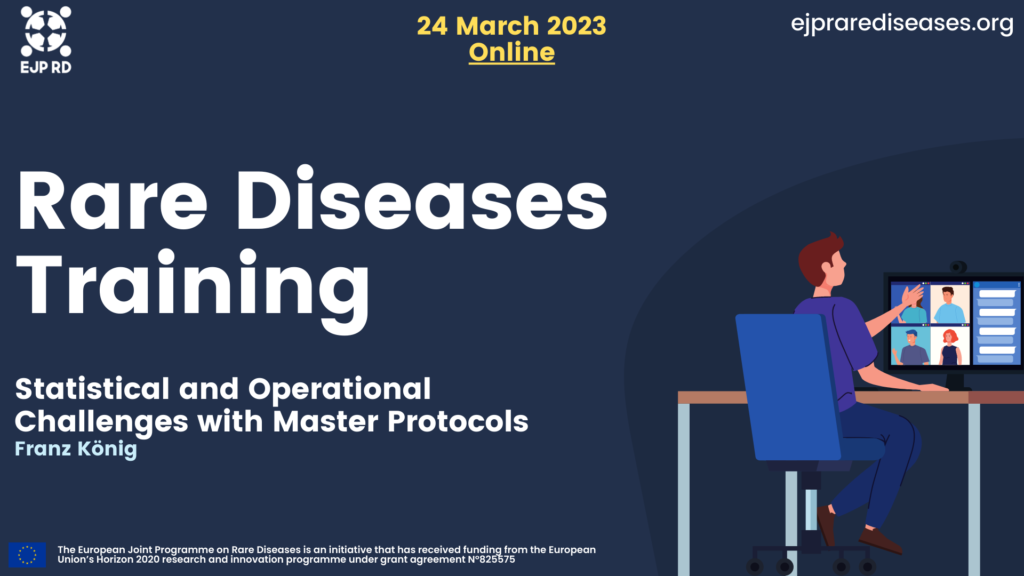
During this webinar, we will explain what is meant by master protocols comparing basket, umbrella and platform trials [1]. We will focus on platform trials and how they compare to traditional drug development programs. Adaptive platform trials provide a framework to simultaneously study multiple treatments in a disease. They are multi-armed trials where interventions can enter as they become available and leave earlier for futility or efficacy based on interim analysis or after evaluation in the final analysis. The attractiveness of platform trials compared to separate parallel-group trials is not only due to operational aspects as a joint trial infrastructure and more efficient patient recruitment, also results from the possibility to share control groups, to efficiently prune non-efficacious treatments, and to allow for direct comparisons between experimental treatment arms. However, the flexibility of the framework also comes with challenges for statistical inference and interpretation of trial results. The major challenges concern the adaptivity of platform trials (decisions on adding or dropping arms cannot be fully pre-specified but may have an impact on current trial arms), multiplicity issues (due to multiple interventions, subgroups and interim analysis) and the use of shared controls [2] (non-concurrent controls and blinding for interventions that have different routes of administration, change in the standard of care). For example, current regulatory guidance requires control of the study-wise type I error rate. How does this relate to testing several treatments? There has been a debate whether a multiplicity adjustment across the whole master protocol is needed. We will overview some statistical approaches recently proposed to address these problems. Furthermore, we will discuss the role of clinical trial simulations [3] in the context of designing more complex master protocols.
References:
- [1] Meyer, E. L., Mesenbrink, P., Dunger-Baldauf, C., Fülle, H. J., Glimm, E., Li, Y., … & König, F. (2020). The evolution of master protocol clinical trial designs: a systematic literature review. Clinical Therapeutics, 42(7), 1330-1360.
- [2] Roig, M. B., Krotka, P., Burman, C. F., Glimm, E., Gold, S. M., Hees, K., … & Posch, M. (2022). On model-based time trend adjustments in platform trials with non-concurrent controls. BMC medical research methodology, 22(1), 1-16.
- [3] Meyer, E. L., Mesenbrink, P., Mielke, T., Parke, T., Evans, D., & König, F. (2021). Systematic review of available software for multi-arm multi-stage and platform clinical trial design. Trials, 22(1), 1-14.
Lecturer’s biosketch
 Franz König is currently Associate Professor at the Section of Medical Statistics at the Medical University of Vienna, Austria. He is currently member of ethics committee of the Medical University of Vienna. From 2008 till 2010 he was seconded to the European Medicines Agency (London, UK) as statistical expert in the Unit Human Medicines Development and Evaluation. His main research interests are multiple testing, adaptive/flexible designs, interim analyses and data safety monitoring boards (DSMB).
Franz König is currently Associate Professor at the Section of Medical Statistics at the Medical University of Vienna, Austria. He is currently member of ethics committee of the Medical University of Vienna. From 2008 till 2010 he was seconded to the European Medicines Agency (London, UK) as statistical expert in the Unit Human Medicines Development and Evaluation. His main research interests are multiple testing, adaptive/flexible designs, interim analyses and data safety monitoring boards (DSMB).
He was work package leader of the work package « adaptive designs » in the EU FP7- funded research project IDEAL (Grant Agreement No 602552) and deputy coordinator of an EU Horizon 2020 funded Marie Curie ITN network IDEAS on early drug development studies (Grant Agreement No 633567). Currently he is involved as WP-lead in the IMI project EU-Pearl which is on platform trials.
The aim of the lecture is:
- to learn about master protocols and the differences between basket, umbrella and platform trials
- to understand the difference between traditional drug development programs and more complex designs like platform trials using a master protocol
- to understand the key statistical challenges with respect to multiplicity and sharing control data across the platform trial
- to know the potential advantages and disadvantages of designing and running platform trials in rare disease
This training is at an advanced level course. While an overview will be given, without all technical details, a variety of statistical modelling and inference concepts will be used.
This training is divided in two parts:
The first part of the webinar, of about 1.5 hours, is devoted to the lecture on statistical and operational challenges with master protocols presented by Franz König.
The second part of the webinar consists of one hour of panel discussion with known experts from different fields bringing various perspectives of the topic. This will include the regulatory, pharma-industrial, academic, and clinical perspective. In particular, questions from the audience will be answered while reflecting these different perspectives.
The training webinar is organized as a series of lectures presented by experts in the specific topics. Interaction between participants and lecturers will be facilitated by moderated question & answer sessions.
The workshop is open to the international research community, clinicians, medical specialists, healthcare professionals and advocacy patient groups with knowledge on the RD Clinical Trials.
REGISTRATION
The registration is mandatory here.
REGISTRATION DEADLINE: 23 March 2023 at 23:45 p.m.
The training and registration are free of charge. The training organisers will not cover expenses incurred by the participants in any way.
At the end of the training, participants will be requested to fill an online questionnaire as feedback for learning and impact assessment.
A certificate of attendance will be given at the end to the participants who attended the entire webinar. No credits of Continuing Education in Medicine will be issued.
English
Online. Details for the connection will be provided the day of the webinar to registered participants.
This Training webinar is organized by Universitaetsklinikum Aachen (Germany) and Assistance Publique Hopitaux de Paris (France).
If you have questions, please contact the course organisers through this email address: dbodden@ukaachen.de and maya.dirani@ejprd-project.eu.
Please, indicate in the Subject: WP20 March training webinar
